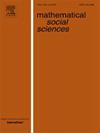Envy-freeness and maximum Nash welfare for mixed divisible and indivisible goods
IF 0.7
4区 经济学
Q4 ECONOMICS
引用次数: 0
Abstract
We study fair allocation of resources consisting of both divisible and indivisible goods to agents with additive valuations. When only divisible or indivisible goods exist, it is known that an allocation that achieves the maximum Nash welfare (MNW) satisfies the classic fairness notions based on envy. Moreover, the literature shows the structures and characterizations of MNW allocations when valuations are binary and linear (i.e., divisible goods are homogeneous). In this paper, we show that when all agents’ valuations are binary linear, an MNW allocation for mixed goods satisfies the envy-freeness up to any good for mixed goods (EFXM). This notion is stronger than an existing one called envy-freeness for mixed goods (EFM), and our result generalizes the existing results for the case when only divisible or indivisible goods exist. When all agents’ valuations are binary over indivisible goods and identical over divisible goods (e.g., the divisible good is money), we extend the known characterization of an MNW allocation for indivisible goods to mixed goods, and also show that an MNW allocation satisfies EFXM. For the general additive valuations, we also provide a formal proof that an MNW allocation satisfies a weaker notion than EFM.
可分与不可分混合商品的无嫉妒性与最大纳什福利
我们研究了由可分商品和不可分商品组成的资源公平分配给具有附加价值的代理。当只有可分或不可分的商品存在时,已知实现纳什福利最大化的分配满足基于嫉妒的经典公平概念。此外,文献显示了二元和线性估值时MNW分配的结构和特征(即,可分商品是同质的)。在本文中,我们证明了当所有主体的估值都是二元线性时,混合商品的MNW分配满足混合商品的任意商品的嫉妒自由度(EFXM)。这个概念比现有的一个称为混合商品的嫉妒自由(EFM)的概念更强,并且我们的结果推广了只有可分或不可分商品存在的情况下的现有结果。当所有主体对不可分割商品的估价是二元的,而对可分割商品的估价是相同的(例如,可分割商品是货币),我们将不可分割商品的MNW分配的已知特征扩展到混合商品,并证明了MNW分配满足EFXM。对于一般的加性估值,我们还提供了一个形式证明,证明MNW分配满足比EFM更弱的概念。
本文章由计算机程序翻译,如有差异,请以英文原文为准。
求助全文
约1分钟内获得全文
求助全文
来源期刊

Mathematical Social Sciences
数学-数学跨学科应用
CiteScore
1.30
自引率
0.00%
发文量
55
审稿时长
59 days
期刊介绍:
The international, interdisciplinary journal Mathematical Social Sciences publishes original research articles, survey papers, short notes and book reviews. The journal emphasizes the unity of mathematical modelling in economics, psychology, political sciences, sociology and other social sciences.
Topics of particular interest include the fundamental aspects of choice, information, and preferences (decision science) and of interaction (game theory and economic theory), the measurement of utility, welfare and inequality, the formal theories of justice and implementation, voting rules, cooperative games, fair division, cost allocation, bargaining, matching, social networks, and evolutionary and other dynamics models.
Papers published by the journal are mathematically rigorous but no bounds, from above or from below, limits their technical level. All mathematical techniques may be used. The articles should be self-contained and readable by social scientists trained in mathematics.
 求助内容:
求助内容: 应助结果提醒方式:
应助结果提醒方式:


